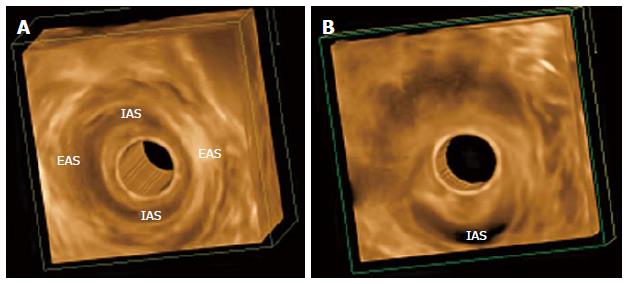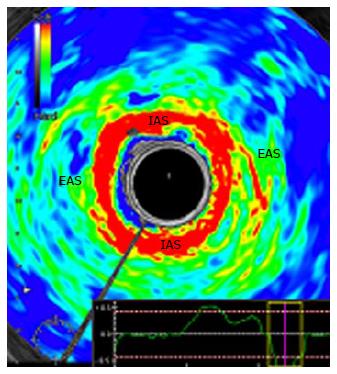Copyright
©The Author(s) 2015.
World J Gastrointest Endosc. Jun 10, 2015; 7(6): 575-581
Published online Jun 10, 2015. doi: 10.4253/wjge.v7.i6.575
Published online Jun 10, 2015. doi: 10.4253/wjge.v7.i6.575
Figure 1 Endoanal ultrasound images of patients with fecal incontinence.
A: A combined defect (arrow) of the external anal sphincter (EAS) from 10 to 2 o’clock and of the internal anal sphincter (IAS) from 9 to 3 o’clock positions, in a woman due to an obstetric anal sphincter injury; B: An anterior EAS defect (arrow), in a woman due to an obstetric anal sphincter injury; C: An IAS defect (arrow) from 8 to 4 o’clock position, in a man as a complication of a previous anorectal surgery (due to fistula).
Figure 2 Three-dimensional endoanal ultrasonography images.
A: Normal appearance of the external anal sphincter (EAS) and internal anal sphincter (IAS); B: An IAS defect in woman as a complication of a previous anorectal surgery (due to fistula).
Figure 3 Normal appearance of the internal and external anal sphincters in endoanal ultrasound real-time elastography.
The internal anal sphincter appears in red (softer) and external anal sphincter in green/blue (harder). EAS: External anal sphincter; IAS: Internal anal sphincter.
- Citation: Albuquerque A. Endoanal ultrasonography in fecal incontinence: Current and future perspectives. World J Gastrointest Endosc 2015; 7(6): 575-581
- URL: https://www.wjgnet.com/1948-5190/full/v7/i6/575.htm
- DOI: https://dx.doi.org/10.4253/wjge.v7.i6.575











